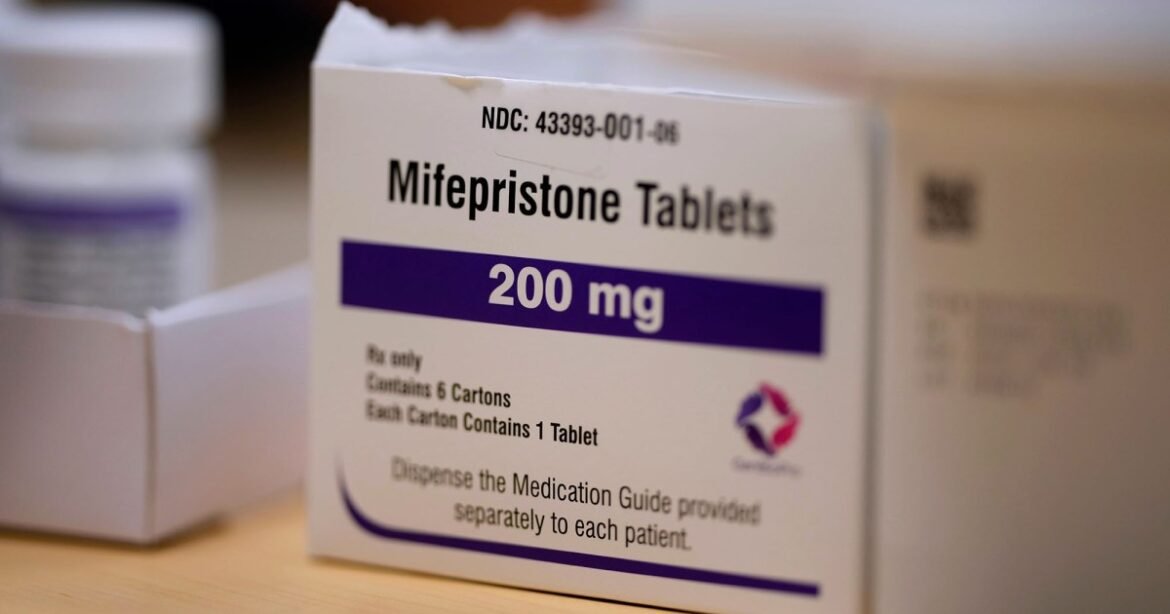Mifepristone tablets at a Planned Parenthood clinic, July 18, 2024, in Ames, Iowa. AP Photo/Charlie Neibergall, File
In anti-abortion Republicans’ latest attack on abortion pills, Florida’s attorney general is suing Planned Parenthood for allegedly misrepresenting the safety of the drugs—despite the fact that more than 100 scientific studies have shown they are safe and effective.
The 37-page lawsuit, announced by Attorney General James Uthmeier’s office on Thursday and filed in Florida’s First Judicial Circuit Court, alleges that Planned Parenthood “sells profitable abortions to vulnerable women by lying to them about abortion pills being safer than Tylenol.” Experts routinely make the comparison that use of the abortion pills—which include mifepristone, which blocks the pregnancy hormone progesterone, and misoprostol, which expels the pregnancy—are safer than Tylenol or even full-term pregnancy. Research shows that serious complications from medication abortion occur in less than half a percent of cases.
The Florida lawsuit claims that all abortions “violate the Hippocratic Oath and deny the inalienable rights of all human beings.”
But Uthmeier’s lawsuit paints a far more dire picture. It’s riddled with familiar anti-abortion arguments and misinformation. For example, it cites openly anti-abortion sources, including the anti-abortion group Live Action, as well as a non-peer reviewed report from the right-wing Ethics and Public Policy Center that claimed to show higher rates of complication from the pills, but that experts say has a flawed methodology, as I have previously written. The Florida lawsuit also claims that all abortions “violate the Hippocratic Oath and deny the inalienable rights of all human beings.” Uthmeier is suing under the state’s deceptive marketing and racketeering laws, and is seeking more than $350 million in damages, attorneys’ fees, the dissolution of Planned Parenthood in Florida, and the revocation of its state licenses.
Spokespeople for Planned Parenthood did not immediately respond to a request for comment from Mother Jones on Sunday, but in a statement provided to the Associated Press, Susan Baker Manning, general counsel for the Planned Parenthood Federation of America, said: “Anti-abortion lawmakers and officials are relentless in their effort to end access to all abortion care, and to stop patients from getting accurate medical information. We will continue to be just as relentless in our effort to defend access to this safe, effective care. See you in court.” Alexandra Mandado, the president and CEO of Planned Parenthood of Florida, told the Tampa Bay Times the lawsuit is “a politically motivated attack” and an “attempt to erode access to all abortion care.”
Abortion is banned in Florida after six weeks of pregnancy, but telehealth abortion providers have continued prescribing and mailing abortion pills into Florida and other states with bans. More than 70 percent of reproductive age women in the state believe abortion should be legal in all or most cases, including a majority of Republicans, Kaiser Family Foundation found last year. After the Supreme Court overruled Roe v. Wade in June 2022, use of abortion pills drastically increased nationwide, and they now account for more than 60 percent of all abortions. The Food and Drug Administration (FDA) permits use of mifepristone to end a pregnancy through ten weeks’ gestation, but abortion advocates say it is safe and effective later as well; the World Health Organization says, for example, that it can be used anytime in the first trimester.
But as the pills’ popularity has increased, so have the coordinated attacks, as I wrote back in September:
Health and Human Services Secretary Robert F. Kennedy Jr. and FDA Commissioner Marty Makary announced that HHS would conduct a new review of mifepristone, after hinting they would do so back in May, as I reported at the time. In their announcement, which reportedly came as a response to a letter Republican attorneys general wrote to Kennedy and Makary back in July, the officials cited a report produced by the Ethics and Public Policy Center, a right-wing organization that was on the advisory board of Project 2025, which claims to have unearthed a higher-than-previously-reported rate of complications from the pills.
[…]
As my colleague Madison Pauly and I reported back in January, anti-abortion groups sent letters to the Department of Justice and FDA requesting they roll back access to medication abortion by enforcing the 19th-century anti-obscenity Comstock Act, restoring the seven-week gestational limit, and rescinding the Biden-era telehealth regulation. Project 2025, the lengthy playbook for Trump’s second term, also recommended the DOJ enforce the dormant Comstock Act to ban the mailing of abortion pills, though President Donald Trump claimed last year that it was “very unlikely” the FDA would roll back access or that the DOJ would enforce Comstock.
In 2022, an anti-abortion group calling itself the Alliance for Hippocratic Medicine sued in Texas, challenging the FDA’s initial approval of mifepristone as well as the agency’s later moves to expand access. The Supreme Court rejected the suit last year, saying the anti-abortion medical providers didn’t have standing to bring it. But attorneys general in at least six red states, including Texas and Florida, have since intervened in a bid to revive the case. Other suits are trying to curtail access by claiming mifepristone could contaminate drinking water.
There have also been myriad efforts to limit and penalize access at the state level. Last year, Louisiana became the first state to classify mifepristone and misoprostol as controlled substances, a move that one doctor predicted would also impact non-abortion-related care, including postpartum hemorrhages and IUD insertions. This month, Texas enacted a radical bill that allows allows private citizens to sue anyone who “manufactures, distributes, mails, transports, delivers, prescribes, or provides” abortion pills to Texans for at least $100,000. Officials in Texas and Louisiana have sought to punish doctors in New York and California who mailed abortion pills into their states under shield laws.



